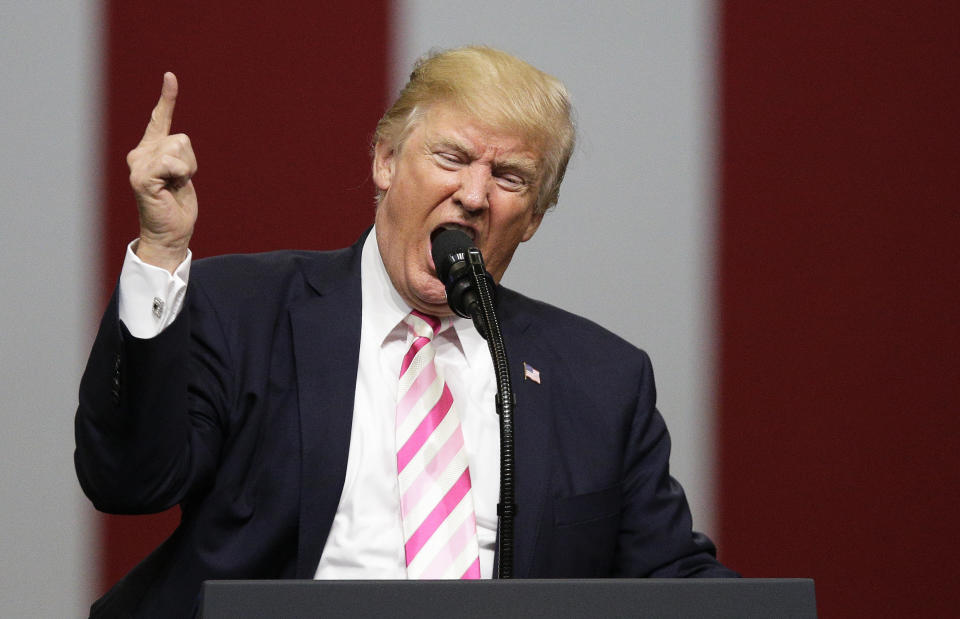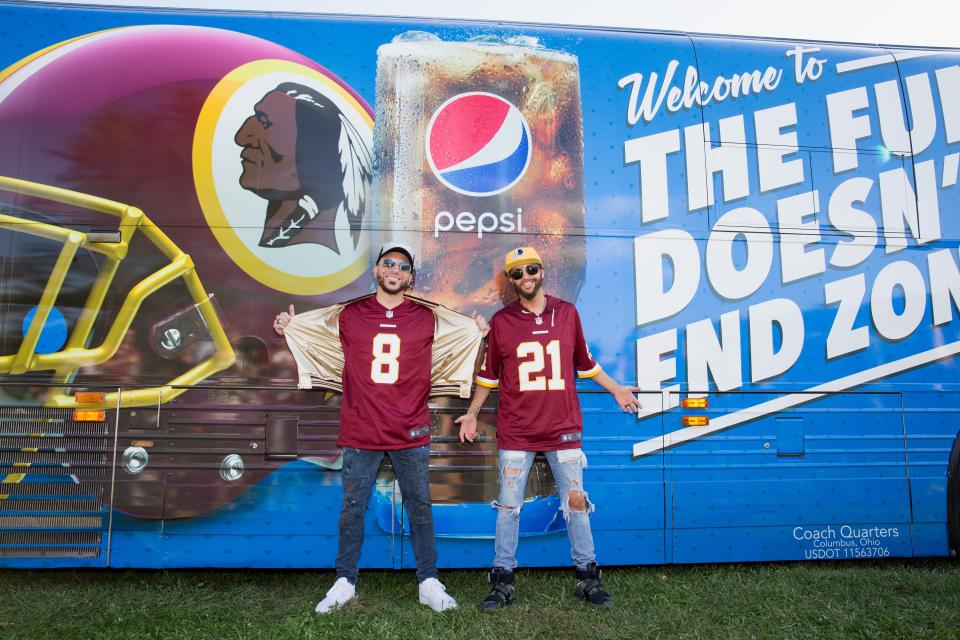After Trump's comments on NFL, league sponsors will set the tone
In case you wondered whether the National Football League would again find itself at the center of political controversy this season, wonder no more: the answer is yes.
On Friday night at a rally in Alabama, President Trump called NFL players who kneel or sit during the national anthem “sons of bitches,” and said that teams should fire them.
Trump appealed directly to NFL owners by asking the crowd: “Wouldn’t you love to see one of these NFL owners, when somebody disrespects our flag, to say, ‘Get that son of a bitch off the field right now. Out! He’s fired. He’s fired!'” And he directly encouraged fans to walk out of games when a player protests during the anthem: “If you see it, even if it’s one player, leave the stadium, I guarantee things will stop.”
The first team owners to respond were John Mara and Steve Tisch of the New York Giants: in a statement on Saturday, they called Trump’s comments “inappropriate, offensive and divisive.” More owners have followed. At the league level, the NFL released a statement in which Commissioner Roger Goodell called the comments “divisive” and said they “demonstrate a lack of respect for the NFL, our great game and all of our players.”
But what matters next, for the business of the NFL, is how NFL sponsors react.

The NFL is estimated to bring in an all-time-high $14 billion in revenue this year, and more than $1.25 billion of its revenue last year came from fees that official league sponsors pay to be associated with football at the highest relationship level.
When there is an NFL scandal — whether it’s a horrifying report about 110 out of 111 deceased players’ brains testing positive for CTE; or a domestic violence case ruling not going the league’s way; or a growing number of players protesting the anthem, potentially offending many fans — all that matters to the business of the league is whether sponsors walk away. And they never walk away. (Even when TV ratings dip, it is for the most part a financial risk to the cable networks that show games, not to the league unless ratings get so bad that advertisers flee.)
Who are the “official sponsors” of the NFL? This season, it’s: Anheuser-Busch InBev; Barclays; Bose; Bridgestone; Campbell’s; Castrol; Dannon; DMI; EA Sports; Extreme Networks; FedEx; Ford; Frito-Lay (PepsiCo-owned); Gatorade (PepsiCo-owned); Hyundai; Intel; Marriott; Mars; McDonald’s; Microsoft; Nationwide; New Era; News America; Nike; Papa John’s; PepsiCo; Procter & Gamble; Quaker; Sirius XM; Ticketmaster; Under Armour; USAA; Verizon; Visa; and Zebra.
Will these brands take a side in this latest battle of words: President Trump vs the NFL?

Some brands may say something, but don’t expect them to say very much. And don’t expect any to shrink in any way from their relationship with the league.
That’s because, in the words of Wasserman managing partner Elizabeth Lindsey, who works with brands like these on their NFL sponsorships, “Football is football… a phenomenon, a juggernaut… It’ll always continue to garner attention from the marketers, primarily because it garners that much attention from the fans.”
(NFL sponsors, and how they react to NFL scandals, was the topic of Episode 2 of our Yahoo Finance Sportsbook podcast on the business of football, with Lindsey as our special guest. You can listen on iTunes or scroll down to the bottom of this post.)
For past examples, look at how league sponsors responded when the NFL was under fire in 2014 for its handling of the domestic violence case against running back Ray Rice. Many issued statements expressing outrage, but none did more than a delicate PR move.
AB InBev said it was, “disappointed and increasingly concerned by the recent incidents that have overshadowed this NFL season” and was, “not yet satisfied with the league’s handling of behaviors that so clearly go against our own company culture and moral code.” PepsiCo CEO Indra Nooyi said she was, “deeply disturbed” by “the repugnant behavior of a few players and the NFL’s acknowledged mishandling of these issues.”
Three years later, AB InBev and Pepsi are still proud league sponsors.
For a more current example, look at Under Armour, which has already put out a tweet on Trump’s comments about the player protests. (And Under Armour has dealt with Trump-related PR problems all year.)
.@UnderArmour stands for the flag and by our Athletes for free speech, expression and a unified America.
— Under Armour News (@UAnews) September 23, 2017
That tweet perfectly hedges, attempting to please both the people offended by player protests and the people offended by Trump’s criticisms of the player protests. The company “stands by the flag and by our athletes.” The statement appears to take a strong stand, while actually saying nothing.
In the days to come, as news outlets dissect the fallout, and pro athletes send out tweets, look for NFL sponsors to either do nothing or issue a careful, walking-on-eggshells statement.
But as political issues continued to bleed into sports in 2017 (and into all industries, all corners of American business), soon sponsors may be forced to do more than put out a cautious statement.
—
Daniel Roberts is the sports business writer at Yahoo Finance. Follow him on Twitter at @readDanwrite. Sportsbook is our sports business video and podcast series.
Read more:
From Tiki to Tic Tac, brands are forced to get political in the Trump era
Barstool Sports CEO: Many media outlets ‘forgot they were consumer brands’
SportsCenter anchor Jemele Hill on ESPN’s politics: ‘The athletes are dragging us here’
SportsCenter chief on ESPN’s politics: ‘Imagine Jackie Robinson happened today’
Inside the ugly breakup of Sports Illustrated, The Cauldron, and Chat Sports
